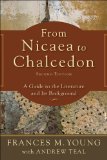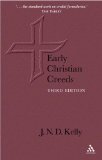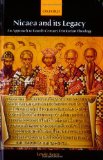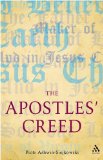|
Relevant
books
available at Amazon
 
Frances Young
-----
 
J.N.D. Kelly
-----
 
Lewis Ayres -----
 
Piotr Ashwin-Siejkowski
Early Christian Doctrine and the Creeds
-----
 
Piotr Ashwin-Siejkowski
-----
Liuwe H. Westra
Apostles' Creed: Origin History and Some Early Commentaries (Instrumenta Patristica Et Mediaevalia, 43)
|
27. However they did not stand even to this; for again at Sirmium they met
together against Photinus and there composed a faith again, not drawn out into
such length, not so full in words; but subtracting the greater part and adding
in its place, as if they had listened to the suggestions of others, they wrote
as follows:—
We believe in One God, the Father Almighty, the Creator and Maker of all things,
‘from whom all fatherhood in heaven and earth is named’. And in His
Only-begotten Son, our Lord Jesus the Christ, who before all the ages was
begotten from the Father, God from God, Light from Light, by whom all things
were made, in heaven and on the earth, visible and invisible, being Word and
Wisdom and True Light and Life, who in the last of days was made man for us, and
was born of the Holy Virgin, and crucified and dead and buried, and rose again
from the dead the third day, and was taken up into heaven, and sat down on the
right hand of the Father, and is coming at the consummation of the age, to judge
quick and dead, and to render to every one according to his works; whose Kingdom
being unceasing endures unto the infinite ages; for He shall sit on the right
hand of the Father, not only in this age, but also in that which is to come. And
in the Holy Ghost, that is, the Paraclete; which, having promised to the
Apostles to send forth after His ascension into heaven, to teach and to remind
them of all things, He did send; through whom also are sanctified the souls of
those who sincerely believe in Him.
(1.) But those who say that the Son was from nothing or from other subsistence
and not from God, and that there was time or age when He was not, the Holy and
Catholic Church regards as aliens.
(2.) Again we say, Whosoever says that the Father and the Son are two Gods, be
he anathema.
(3.) And whosoever, saying that Christ is God, before ages Son of God, does not
confess that He has subserved the Father for the framing of the universe, be he
anathema.
(4.) Whosoever presumes to say that the Ingenerate, or a part of Him, was born
of Mary, be he anathema.
(5.) Whosoever says that according to foreknowledge the Son is before Mary and
not that, generated from the Father before ages, He was with God, and that
through Him all things were originated, be he anathema.
(6.) Whosoever shall pretend that the essence of God is dilated or contracted,
be he anathema.
(7.) Whosoever shall say that the essence of God being dilated made the Son, or
shall name the dilation of His essence Son, be he anathema.
(8.) Whosoever calls the Son of God the mental or pronounced Word, be he
anathema.
(9.) Whosoever says that the Son from Mary is man only, be he anathema.
(10.) Whosoever, speaking of Him who is from Mary God and man, thereby means God
the Ingenerate, be he anathema.
(11.) Whosoever shall explain ‘I God the First and I the Last, and besides Me
there is no God,’ which is said for the denial of idols and of gods that are
not, to the denial of the Only-begotten, before ages God, as Jews do, be he
anathema.
(12.) Whosoever hearing ‘The Word was made flesh,’ shall consider that the Word
has changed into flesh, or shall say that He has undergone alteration by taking
flesh, be he anathema.
(13.) Whosoever hearing the Only-begotten Son of God to have been crucified,
shall say that His Godhead has undergone corruption, or passion. or alteration,
or diminution, or destruction, be he anathema.
(14.) Whosoever shall say that ‘Let Us make man’ was not said by the Father to
the Son, but by God to Himself, be he anathema.
(15.) Whosoever shall say that Abraham saw, not the Son, but the Ingenerate God
or part of Him, be he anathema.
(16.) Whosoever shall say that with Jacob, not the Son as man, but the
Ingenerate God or part of Him, has wrestled, be he anathema.
(17.) Whosoever shall explain, ‘The Lord rained fire from the Lord’ not of the
Father and the Son, and says that He rained from Himself, be he anathema. For
the Son, being Lord, rained from the Father Who is Lord.
(18.) Whosoever, hearing that the Father is Lord and the Son Lord and the Father
and Son Lord, for there is Lord from Lord, says there are two Gods, be he
anathema. For we do not place the Son in the Father’s Order, but as subordinate
to the Father; for He did not descend upon Sodom without the Father’s will, nor
did He rain from Himself, but from the Lord, that is, the Father authorising it.
Nor is He of Himself set down on the right hand, but He hears the Father saying,
‘Sit Thou on My right hand’.
(19.) Whosoever says that the Father and the Son and the Holy Ghost are one
Person, be he anathema.
(20.) Whosoever, speaking of the Holy Ghost as Paraclete, shall mean the
Ingenerate God, be he anathema.
(21.) Whosoever shall deny, what the Lord taught us, that the Paraclete is other
than the Son, for He hath said, ‘And another Paraclete shall the Father send to
you, whom I will ask,’ be he anathema.
(22.) Whosoever shall say that the Holy Ghost is part of the Father or of the
Son be he anathema.
(23.) Whosoever shall say that the Father and the Son and the Holy Ghost are
three Gods, be he anathema.
(24.) Whosoever shall say that the Son of God at the will of God has come to be,
as one of the works, be he anathema.
(25.) Whosoever shall say that the Son has been generated, the Father not
wishing it, be he anathema. For not by compulsion, led by physical necessity,
did the Father, as He wished not, generate the Son, but He at once willed, and,
after generating Him from Himself apart from time and passion, manifested Him.
(26.) Whosoever shall say that the Son is without beginning and ingenerate, as
if speaking of two unbegun and two ingenerate, and making two Gods, be he
anathema. For the Son is the Head, namely the beginning of all: and God is the
Head, namely the beginning of Christ; for thus to one unbegun beginning of the
universe do we religiously refer all things through the Son.
(27.) And in accurate delineation of the idea of Christianity we say this again;
Whosoever shall not say that Christ is God, Son of God, as being before ages,
and having subserved the Father in the framing of the Universe, but that from
the time that He was born of Mary, from thence He was called Christ and Son, and
took an origin of being God, be he anathema.
|

